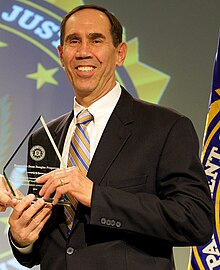Governor Brown Releases 2016 Judicial Appointment Data
SACRAMENTO
– Governor Edmund G. Brown Jr. today released annual applicant and appointee
data for the administration's judicial appointments.
From 2011 through 2016, Governor Brown appointed 356 judges – including 45 in 2016 – from a pool of more than 2,000 applicants. Over those six years, nearly 40 percent of Governor Brown's appointees identified themselves as American Indian or Alaska Native; Asian; Black or African-American; Hispanic; Native Hawaiian or Other Pacific Islander; or Other/Unknown. Last year, Hispanic appointees accounted for more than one in five judicial appointments.
From
2011 through 2016, Governor Brown's judicial appointees included a number of
notable firsts:
- Yvette
Durant, the first woman judge ever appointed to the Sierra County Superior
Court.
- Richard
T. Fields, the first African-American man appointed to the Fourth District
Court of Appeal.
- Marco
D. Nunez, the first openly gay judge ever appointed to the Imperial County
Superior Court.
- Sonia
Cortés, the first Latino judge ever appointed to the Yolo County Superior
Court.
- Marsha
G. Slough, the first openly gay justice in the history of the Fourth
District Court of Appeal.
- Luis A. Lavin, the first openly gay justice to serve on the Second District Court of Appeal.
- Therese M. Stewart, the first openly lesbian justice to serve on the California Court of Appeal;
- Ferdinand P. Inumerable, the first Asian-American judge ever appointed to the Ventura County Superior Court.
- M. Bruce Smith, the first African-American judge to serve on the Fifth District Court of Appeal.
- Paul Lo, the first Hmong American judge ever appointed in the country;
- Sunshine Sykes, the first Native American judge ever appointed to the Riverside County Superior Court;
- Sunil Kulkarni, the first South Asian American judge ever appointed in Northern California;
- Rupa Goswami, the first South Asian American woman judge ever appointed in California.
- Halim Dhanidina, the first American-Muslim judge ever appointed in California;
- Jim Humes, the first openly gay justice ever appointed to the California Court of Appeal;
- Miguel Marquez, the first Latino justice ever appointed to the Sixth District Court of Appeal;
- Rosendo Peña, the first Latino justice ever appointed to the Fifth District Court of Appeal;
- Chris Doehle, the first female judge ever appointed to the Del Norte County Superior Court;
- Kimberly Colwell, the first openly lesbian judge ever appointed to the Alameda County Superior Court;
- Mark Andrew Talamantes, the first Latino judge ever appointed to the Marin County Superior Court;
- Kathleen O'Leary, the first female presiding justice ever appointed to the Fourth District Court of Appeal, Division Three; and
- Raquel Marquez, the first Latina judge ever appointed to the Riverside County Superior Court.
Under SB 56 and SB 182, the Governor is required to disclose aggregate statewide demographic data provided by all judicial applicants by March 1.
[3/1 Update: See the DJ's story Brown Continues to Diversify State Judiciary: Report Gives Brown High Marks on Appointments.]
The Demographic Data report is here.
- Luis A. Lavin, the first openly gay justice to serve on the Second District Court of Appeal.
- Therese M. Stewart, the first openly lesbian justice to serve on the California Court of Appeal;
- Ferdinand P. Inumerable, the first Asian-American judge ever appointed to the Ventura County Superior Court.
- M. Bruce Smith, the first African-American judge to serve on the Fifth District Court of Appeal.
- Paul Lo, the first Hmong American judge ever appointed in the country;
- Sunshine Sykes, the first Native American judge ever appointed to the Riverside County Superior Court;
- Sunil Kulkarni, the first South Asian American judge ever appointed in Northern California;
- Rupa Goswami, the first South Asian American woman judge ever appointed in California.
- Halim Dhanidina, the first American-Muslim judge ever appointed in California;
- Jim Humes, the first openly gay justice ever appointed to the California Court of Appeal;
- Miguel Marquez, the first Latino justice ever appointed to the Sixth District Court of Appeal;
- Rosendo Peña, the first Latino justice ever appointed to the Fifth District Court of Appeal;
- Chris Doehle, the first female judge ever appointed to the Del Norte County Superior Court;
- Kimberly Colwell, the first openly lesbian judge ever appointed to the Alameda County Superior Court;
- Mark Andrew Talamantes, the first Latino judge ever appointed to the Marin County Superior Court;
- Kathleen O'Leary, the first female presiding justice ever appointed to the Fourth District Court of Appeal, Division Three; and
- Raquel Marquez, the first Latina judge ever appointed to the Riverside County Superior Court.
Under SB 56 and SB 182, the Governor is required to disclose aggregate statewide demographic data provided by all judicial applicants by March 1.
[3/1 Update: See the DJ's story Brown Continues to Diversify State Judiciary: Report Gives Brown High Marks on Appointments.]
The Demographic Data report is here.






